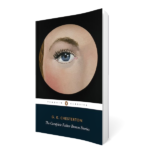According to G.K. Chesterton, every character in a novel is only the author in disguise. We certainly have evidence of this from Chesterton’s own fiction. Indeed, one of the standard criticisms of it is that all the characters sound like Chesterton. Perhaps the thinnest disguise Chesterton ever wears in the pages of a book is when he becomes Innocent Smith in Manalive. But one of his most ingenious masquerades is when he continually squeezes himself into the clerical costume of a little priest named Brown. The amateur detective gives Chesterton a chance to make many prophetic observations to a popular audience that might not pick up one of his books or essays. And some of the priest’s asides may sound downright scandalous to the modern ear. For instance, there is the scandal of democracy, the idea that all men matter: “You matter. I matter. It’s the hardest thing in theology to believe… We matter to God – God only knows why.”
Or: “You don’t need any intellect to be an intellectual.”
Or: “Materialists as a race are rather innocent and simple-minded.”
Or: “Even the most perfectly balanced of agnostics is partly human.”
Or, chillingly: “When a madman murders a King or a President it can’t be prevented…Anybody can murder him who does not mind being a murderer.”
He is also amazingly prophetic about the American cult of celebrity, the rootlessness and barrenness of the university landscape, the puritanical control of society through health and hygiene, and the loudness of a few atheists who want “merely” to abolish God and the Ten Commandments.
But the device of talking through the beloved little Norfolk priest also gives Chesterton a chance to talk about…himself. He explains the dilemma he constantly faces when talking discussing politics with people who think there are only two sides to a political question. He reports that Father Brown, too, is drawn into political debates, “being in some sense called in on both sides.”
And as the Capitalists all reported that, to their positive knowledge, he was a Bolshevist; and as the Bolshevists all testified that he was a reactionary rigidly attached to bourgeois ideologies, it may be inferred that he talked a certain amount of sense without any appreciable effect on anybody.
Father Brown also laments on behalf of the quotable Chesterton: “I always try to say what I mean. But everybody else means such a lot by what I say.”
The Scandal of Father Brown deals with all the political and religious issues that Chesterton deals with in all his writings, the same superstitions, the same sins, the same scandals. “There’d be a lot less scandal,” says Father Brown, “if people idealize sin and pose as sinners.”
Oh, the stories? They’re great! First-rate mysteries with marvelous plots and surprising twists. Eerie crimes and surprising solutions. Chesterton prefigures the modern medical examiners when he notes that the body is the chief witness in every murder. He picks out the most unsuspicious suspects, as in any good detective yarn, but still we don’t suspect them. And then there is that amazing line from “The Blast of the Book,” where a book is described as “lying closed, but as if it had just been opened.” Hm. Still trying to imagine how a book that has just been opened looks different from a book that has only recently been opened, or perhaps opened yesterday or the day before. But never mind. You’ll be curious to find out what was in the book.
Finally, there is “The Insoluble Problem.” Chesterton’s final collection of Father Brown stories ends on a fitting note. Although he penned a couple more stories starring his famous priest-detective, it seems there is something especially artistic about “The Insoluble Problem” being the end-piece of all the tales. The story takes place earlier in Father Brown’s career and brings back his old friend, Flambeau, as a sidekick. They encounter a case where a dead man is found hanging by the neck from a tree…with a sword stuck through him.
“I was wondering,” said Flambeau, “why they should hang a man by the neck till he was dead, and then take the trouble to stick him with a sword.”
“And I was wondering,’’ said Father Brown, “why they should kill a man with a sword thrust through his heart, and then take the trouble to hang him by the neck.”
So what is the solution? The title suggests there isn’t one. But there is. And yet this is a mystery that ends with a mystery. Disappointed? Don’t be. For the lover of detective fiction, it is a sign of hope that there is always one more conundrum to be puzzled over, one more clue to be found, one more mystery to be solved. Yes, we want the solution, but we never want a good story to end.



